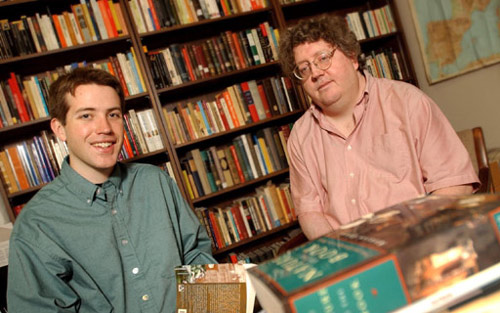Geoffrey Gresh of Lowell, Mass., a senior double major in history and French, is researching British foreign policy in the Ottoman Empire during the 1870s. He is undertaking the yearlong study in pursuit of departmental honors in history.
“This is an area of the world that many people do not know about, and it is important that we learn more about it,” says Gresh, citing the tragedy of Sept. 11 as one reason for study.
“On October 6, 1875, the Ottoman Empire declared bankruptcy, leaving over 200 million pounds of sterling in unpaid debts,” explains Gresh. “Many of the bondholders to those debts were British. I am studying the impact on the financial situation in Great Britain and how it affected and shaped British foreign policy during this decade.”
“Preliminarily, I think that I can argue that the dire financial situation significantly molded British foreign policy during the 1870s because if the bondholders didn’t get their money back, it would have hurt Great Britain’s economy in a substantial way,” continues Gresh. “Furthermore, Great Britain already suffered from a depression which began in 1873.”
“Some of the major events that I will use to argue my point will be the uprisings in the Balkans, which begin in 1875, the Russo-Turkish war of 1877-78, and the establishment of Egypt as a British colony in 1882. I will attempt to show that British foreign policy was significantly influenced by the fact that if the Ottoman Empire dissolved, it would lose a lot of money and such powers like Russia could potentially come in and take over Istanbul and all would be lost for the British.”
To study this subject, Gresh is using numerous bound volumes from the British Foreign Office on its affairs with Turkey during this period. His interest in the Ottoman Empire evolved while he was studying abroad.
“The Ottoman Empire represents a part of the world that has interested me for awhile,” says Gresh. “While abroad in Paris during my junior year in the fall of 2000, I took a course at the Sorbonne about the emergence of the Arabic world. The course was amazing and it triggered my interest in the area. It is a part of the world that offers so much undiscovered history and culture. My topic is so intriguing and fascinating.”
Andrew Fix, professor and head of history, supervised Gresh in EXCEL research two years ago and is now his thesis advisor. In EXCEL, students assist faculty members with research while earning a stipend.
Gresh says, “Professor Fix is doing an excellent job guiding me through the thesis by posing tough questions and directing me regarding how to search for primary documents. I am happy that he was willing to take me on as a thesis student.”
Fix describes Gresh as a first-rate student. “Geoffrey has unusual passion for his subject, tenacity and work ethic, and analytical ability,” says Fix. “He also has excellent language ability in French and German and a desire to learn other languages. He has a scholar’s personality, [putting in] long hours of often lonely work in search of an understanding of the past.”
“He is learning to work with and form conclusions based on primary source materials, such as the texts of international treaties, diplomatic dispatches, parliamentary minutes, letters of government officials and diplomats,” continues Fix. “He is also learning to write a substantial work of history with a sustained argument.”
Gresh thinks that Lafayette has a great academic environment for extensive, independent research projects. “It is so wonderful to have such close contact with Dr. Fix,” says Gresh. “I am able to reach him at all times if I have a problem or a question about my thesis. The library has also been really terrific. The librarians and the inter-library loan office have really done a great job helping me get primary sources from libraries around the country.”
Gresh is a resident adviser and is a member of the French and German Clubs. After the Sept. 11 tragedy, he headed up creation of the Commemorative Quilt, in which students, faculty and staff decorated individual squares on the theme of “peace and unity.” He was a founding member of Lafayette’s Forensics Society.

A National Leader in Undergraduate Research. Geoffrey Gresh ’02 made a presentation on honors research he did under the guidance of Andrew Fix, Dana Professor of History, at the National Conference on Undergraduate Research.
